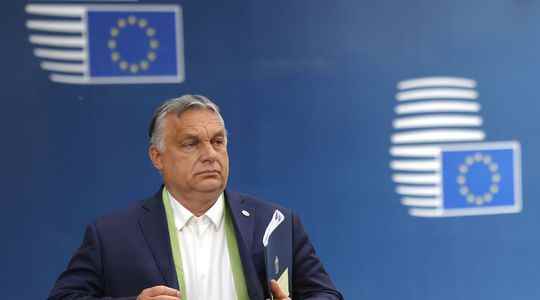Code name: “Eastern Shield 2022”. On Wednesday February 23, as the Russians prepare to bomb Ukraine, Viktor Orban meets his Minister of Defense and the officers leading the operation to secure Hungary’s 140 km border with Ukraine. On a map projected during the meeting, the national army envisages an influx of some 600,000 Ukrainian refugees caused by the Russian invasion.
From the first hours of the offensive, hundreds of pedestrians and cars converged at the customs of Zahony, Beregsurany and Tiszabecs, the main entry points to Hungary. Most of the candidates for the passage were Hungarians from Transcarpathia, a multicultural and poor oblast in the far west of Ukraine. The same evening, a Hungarian government decree offered temporary protection to all arrivals from neighboring Ukraine.
In a video message, Orban, known for his anti-immigrant diatribes, proclaims: “We are ready to welcome them and we will be able to meet the challenge quickly and effectively.” Despite its proximity to the Kremlin, Hungary condemns the Russian attack and rallied sanctions decided by the European Union (EU). Orban and his lieutenants, however, warned that Budapest, a member of NATO, “must stay out of the armed conflict” and that “it is above all not a question of sending troops to Ukraine”.
Blocking sanctions on Russian energy
Thursday evening, several thousand people demonstrated against the invasion in front of the Russian Embassy in Budapest. Péter Marki-Zay, united opposition candidate who is to challenge Viktor Orban in the April 3 elections, demanded at the podium the suspension of the contract for the modernization of the Paks nuclear power plant signed with Moscow in 2014 and the closure of the headquarters of the International Investment Bank in Budapest, reputed to be a hideout for Russian spies.
“A reasonable Hungarian government would suspend the investments shared in common with the Russian aggressor, estimates the Hungarian historian Zoltan Sz. Biro, specialist in Russia. security policy.”
The attack on Ukraine places Orban in a dilemma. Can he still woo Putin in the name of his openness to the East? Or should it break away from it in order to reassure its European partners? “Orban hoped not to have to choose sides, but the context makes that impossible, underlines political scientist Péter Kreko. What is happening now is the failure of twelve years of opening to the East.”
For the time being, the leader maintains his characteristic in-between. On the one hand, he supports the EU position on Russia. On the other, during the European Council on February 24, he obtained that the sanctions do not affect energy, several months after the signing of an important gas agreement linking Budapest and Moscow.
Budapest has had resolutely tense relations with Kiev since an education reform dating from 2017, imposing teaching in Ukrainian in secondary school, to the detriment of minority languages such as Magyar. Hungary indeed accuses its neighbor of mistreating the Magyars of Transcarpathia, while Kiev accuses Budapest of exploiting the Magyarophone minority.
A minister decorated by the Kremlin
Another sign of the understanding between Russia and Hungary: the head of Hungarian diplomacy, Péter Szijjarto, received the Russian medal of the Order of Friendship at the end of December 2021 from the hands of his counterpart Sergei Lavrov, for his contribution to bilateral relations. . On January 20, Szijjarto considered Russia a “partner of strategic importance”, particularly “in terms of economic cooperation, energy security guarantees and defense against the Covid-19 pandemic”.
Over the year 2021, trade relations between the two countries increased by 51% and Hungarian exports to Russia by 15%. Hungary was the first EU state to authorize the Russian vaccine Sputnik V, without waiting for approval from the European Medicines Agency. At the beginning of February, on returning from a noteworthy visit to Moscow, Viktor Orbán affirmed that Russia and Hungary were close to an agreement on the manufacture of Sputnik V vials in the national vaccine factory in Debrecen, the second Magyar city.
In Hungary, the Russian intervention against Ukraine brings back painful memories of the establishment of the communist regime at the end of the Second World War and the crushing of the anti-Soviet uprising of October-November 1956. In the former “the gayest barrack in the socialist camp”, the Orban-Putin relationship is now one of the major issues in the electoral campaign, at the end of which the Magyar leader hopes to win a fourth consecutive term.
